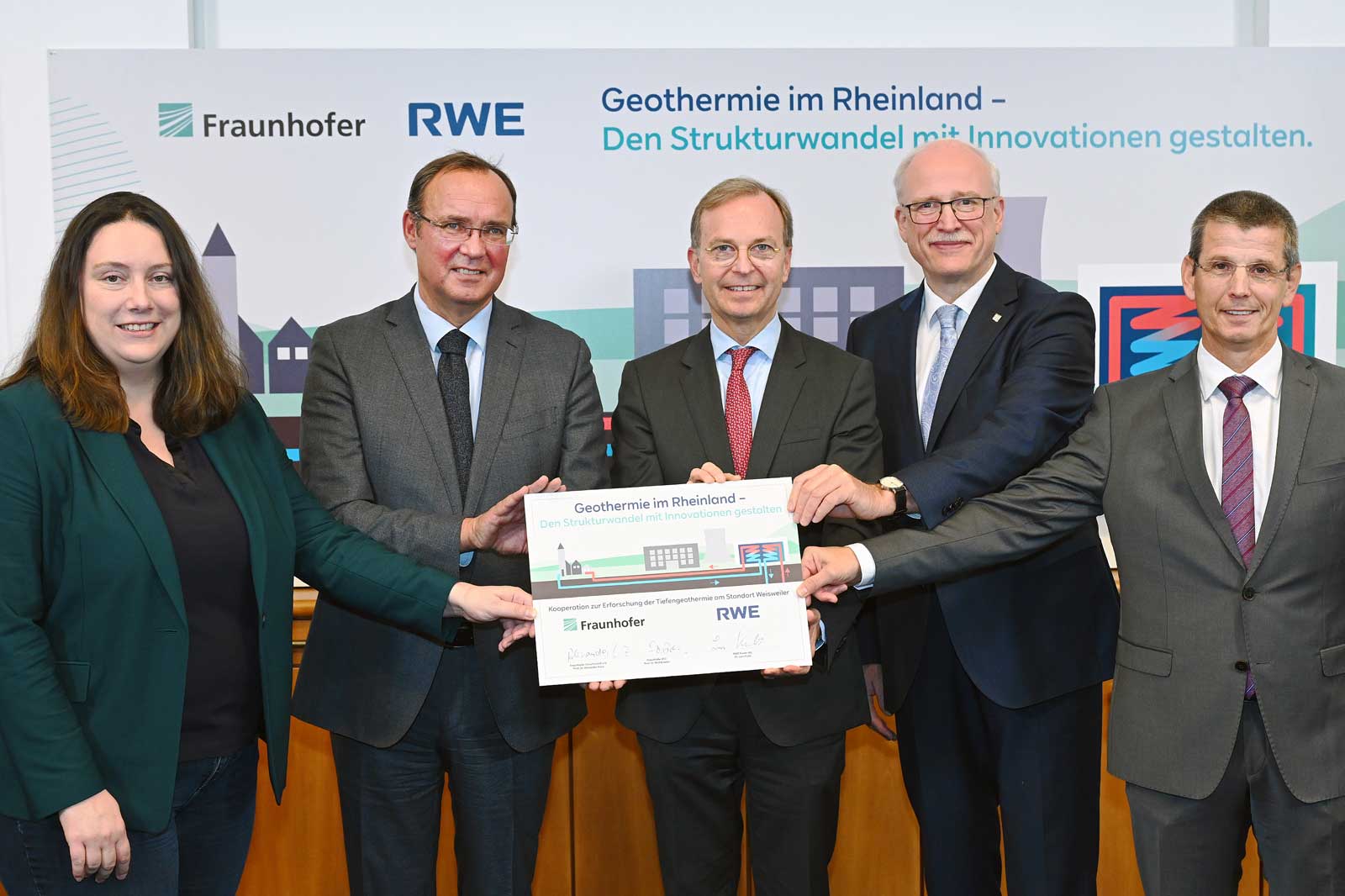RWE announces winners of global offshore wind co-use competition
12.12.2024

Fraunhofer and RWE are working together to further the technical and economic development of deep geothermal energy. They hope to make heat recovery from deep underground ready for operation in a research power plant and for this to serve as an example for future projects. The ground beneath RWE’s Weisweiler site is to be gradually explored to determine the potential of this renewable energy. A geological observatory will also be constructed. Above ground, Fraunhofer will be opening a research facility for geo-resources and building a pilot plant dedicated to geothermal conversion technologies. Fraunhofer and RWE Power have now finalised a cooperation agreement in the presence of the acting Parliamentary State Secretary at the Federal Ministry of Education and Research, Thomas Rachel.
Executive Vice President Professor Alexander Kurz sealed the agreement on behalf of the Fraunhofer Society, and its director Professor Rolf Bracke signed for the Fraunhofer Research Institution for Energy Infrastructures and Geothermal Systems IEG, which will soon also be based in Weisweiler. Executive Board member Dr Lars Kulik signed the cooperation agreement on behalf of RWE Power AG.
Rhenish mining region is prime location for deep geothermal energy
The partners hope to further advance sustainable energy at the traditional plant site. The Rhenish mining region is a prime location for deep geothermal energy, as can be witnessed at Aachen’s thermal springs. Further rock layers with large quantities of hot thermal water are expected to be found below ground; specifically the Devonian and Lower Carboniferous mass and reef limestones, which are around 350 million years old.
All aspects of geothermal plant technology are to be investigated at the site, including high-temperature borehole pumps, marketable processes for generating electricity, heat and cooling, and operating strategies. Material and heat storage methods will also be developed.
Exploratory drilling 1,500 metres underground
Besides the construction of the technical centre on the site provided by RWE, the next practical step will be an exploratory borehole of up to 1,500 metres in depth next year, which the partners will “sink” as part of the EU project DGE-ROLLOUT; DGE stands for deep geothermal energy. Along with the geophysical station above ground, the borehole will act as an observatory for monitoring the subsurface.
Geothermal energy is renewable
In a series of steps yet to be planned, there will be a detailed, three-dimensional, scientific investigation of the subsurface and, based on this, deep drilling of up to 4,000 metres in length. If successful, it will produce warm thermal water. Geothermal energy offers the advantages of sustainability, regional availability, base load capability and low land usage.
State Secretary Thomas Rachel:
“The recently founded Fraunhofer Research Institution for Energy Infrastructures and Geothermal Systems aims to address two key challenges of our time: climate protection and successful structural change. The Rhenish mining region is an important location for energy and research. The cooperation between RWE and Fraunhofer IEG leverages existing expertise and builds on tradition,” said Thomas Rachel, Parliamentary State Secretary at the Federal Ministry of Education and Research, speaking at the signing of the agreement.
Fraunhofer Executive Vice President Alexander Kurz:
“Geothermal energy clearly has the potential to play a central role in the future heat supply. With Fraunhofer IEG at the Weisweiler site, we are providing an excellent platform for application-oriented research in this field. Our cooperation with RWE enables us to make important contributions to the energy transition and to achieving national climate protection goals, and to boost the structural transformation of the Rhenish mining region,” said Fraunhofer Executive Vice President Alexander Kurz in Weisweiler.
Director of Fraunhofer IEG Rolf Bracke:
“Over 50 percent of the energy generated in Germany is used to heat households and industry. To protect the climate, we need to generate heat without using the primary energy sources coal, natural gas and oil within the next few years. Geothermal energy and modern heating networks can provide a carbon-neutral energy source in the long term based on regional expertise, bridging the gap between coal mining and heat mining. The Weisweiler laboratory will be a pilot site for the whole of Northwest Europe, both in terms of geology and the energy industry,” said Rolf Bracke of Fraunhofer IEG, outlining the scope of the research project.
Mayor Nadine Leonhardt:
“Eschweiler is an open-cast mining community in the midst of structural change. As a leading business location, we are delighted that the Fraunhofer Institute and RWE have made a commitment to the Weisweiler site. We are working shoulder to shoulder to ensure that we achieve structural change and transform jobs,” said Eschweiler’s Mayor Nadine Leonhardt.
RWE Power Executive Board member Lars Kulik:
“District heating from thermal water represents a new technological component of the energy transition for our region. Our long-established energy site in Weisweiler has everything that is needed to implement this innovative project,” said RWE Power Executive Board member Lars Kulik, expressing his delight. “District heating pipelines run from the Weisweiler site to Aachen. When district heating generated from renewable sources passes through it one day, it will represent another substantial contribution made by RWE to regional structural change.”
Infrastructure already in place
The infrastructure for heat supply is already available at the site thanks to the Aachen-Weisweiler district heating network. It already supplies district heating from the Weisweiler lignite-fired power plant to Aachen and other areas. However, the heat source lignite will need to be replaced by other primary energy sources in the medium term as a result of the coal phase-out – and deep geothermal energy could be an option here. The idea behind the technical centre has been awarded its 3rd star as part of the SofortprogrammPlus scheme for the Rhenish mining region of the future. Additional measures have been submitted to governmental funding entities for approval.